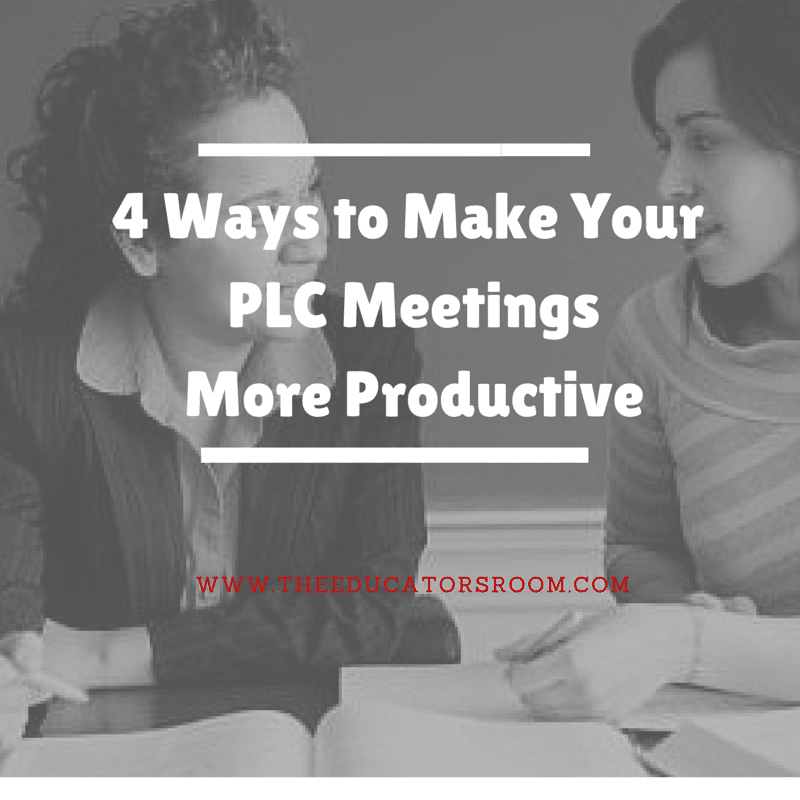The quickest way to send any teacher into a frenzy is to make us sit in an ineffective PLC (professional learning community) meeting. We’d rather grade a million essays, meet with an irate parent or even hear nails scratched on our chalkboard–anything but another meeting that tells us how to use graphic organizers. After sitting in a meeting where I was about to fall asleep, I began to think about the actual purpose of PLCs. Were they created to wreak havoc on teacher’s schedules or do they really have a purpose? After doing a bit of research, I came across the book Learning by Doing PLC’s which told me that PLCs are meant to:
• focus on teaching to a focus on learning
• provide Infrequent summative assessments to frequent common formative assessments
• help determine the appropriate response when students don’t learn or already know it to a systematic response that ensures support for every student no matter who the teacher may be
• clarify what students must learn to collaborative teams building shared knowledge and understanding about essential learning • An external focus on issues outside the school to an internal focus on steps staff can take to improve the school
• focus on issues outside the school to an internal focus on steps staff can take to improve the school
Wait, what? How is that most PLCs that I’m a part of consist of nothing of the above? Instead, they are usually time for our administration team to tell us what we are NOT doing right.
[fusion_builder_container hundred_percent=”yes” overflow=”visible”][fusion_builder_row][fusion_builder_column type=”1_1″ background_position=”left top” background_color=”” border_size=”” border_color=”” border_style=”solid” spacing=”yes” background_image=”” background_repeat=”no-repeat” padding=”” margin_top=”0px” margin_bottom=”0px” class=”” id=”” animation_type=”” animation_speed=”0.3″ animation_direction=”left” hide_on_mobile=”no” center_content=”no” min_height=”none”][bctt tweet=”That’s right..in most schools PLCs SUCK.” username=”EducatorsRoom”]
If the overall goal(s) of Professional Learning Communities are supposed to be focused on teachers learning from one another , how did they become meetings where teachers are engrossed in doing anything beneficial to classroom instruction? When did these meetings become a time to roll our eyes and resent the time we spend in them?
[bctt tweet=”The answer is simple, PLC’s became ineffective when administrators used it for ‘filler’ for any and everything they wanted to accomplish in the school.” username=”EducatorsRoom”]
The answer is simple, PLC’s became ineffective when administrators used it for ‘filler’ for any and everything they wanted to accomplish in the school. Combined with making teachers painfully endure these meetings on a weekly schedule, has made a ‘recipe for disaster’.
Knowing that PLCs are common occurrences in most schools, how do you make the meetings worthwhile and engaging to educators? Click below to follow these simple four tests to ensure that these meetings are more productive! (Note: share this article with your administration team.)
1. Let your grade/content level teams set the agendas for the meeting. Nothing is worse than sitting in a PLC meeting with an agenda that has nothing to do with your work in the classroom. This is a ‘sure fire’ way to make teachers ‘zone out’ well before the first item on the agenda is addressed. Instead, enlist your content /grade level leaders to develop an agenda for the meeting. Encourage them to look at issues that are occurring in their team(s) and then set up an agenda that will not only address the issue but offer proactive solutions at the school level. Every PLC meeting should be teacher lead, not administrative lead.
2. Differentiate the delivery of instruction in the meetings. It makes no sense to make a veteran teacher sit in a PLC about the use of graphic organizers or for a teacher who has excellent classroom management to sit in a PLC about classroom management. In addition, I’ve been forced to sit in PLCs where a PowerPoint was played and teachers were expected to sit for 60 minutes and ‘get’ information. Instead, assess the specific needs of your school staff by using a survey. Based upon the results, adjust your meeting content. Another good strategy to increase teacher ‘buy in’ will be to identify the faculty that may be ‘experts’ in various areas and ask them to present at PLCs. This will help break up the monotony of meetings.
3. Set a specific time slot and days for the meetings to occur. There’s no reason that any PLC meeting has to last an entire planning period. Set a designated time frame for your meetings and stick to it–no matter what. Agree to group ‘norms’ so that people can arrive on time and be ‘present’ in the meeting so that the work can be completed. Teachers are already ‘bogged down’ by district mandates, classroom needs, and other professional development.
[bctt tweet=”Respect our time.” username=”EducatorsRoom”]
4. Plan activities that matter. No teacher wants to sit in a meeting and look at graphic organizers for 45 minutes. Instead take the time to develop activities that allow teachers to reflect and engage in the work they do in the classroom. Ask teachers to bring in student work or sample assignments and lead discussions on common trends in student work. Take time and do case conferencing on students who are behind academically. Even take this time to contact parents who children are having discipline issues. The point is this- use this time to actually strengthen the culture of the school- not just to have another meeting.
Now tell us how PLC meetings are handled at your school?
[bctt tweet=”Use this time to actually strengthen the culture of the school- not just to have another meeting. ” username=”EducatorsRoom”]
[/fusion_builder_column][/fusion_builder_row][/fusion_builder_container]






My team meets in a PLC for 45 minutes 5 days a week. We NEVER have time to work in our rooms (changing bulletin boards, organizing materials, preparing lessons, etc.) Is it really effective to have a 45 minute PLC EVERY DAY???
noooo is so bad you are right
Do you think your thoughts on making PCL more effective is the same for a special education classroom? If so why? If not, why is that?
What PLC meetings do is 50% a waste of time. I have been told that administrators tend to hog up time. There are no longer regular teacher’s meetings where other issues can be discussed. Instead, some administrators now use the PLC meetings to spew the information and discuss issues that have nothing to do with PLC. I do believe that the PLC creators should send out memos to every school district and say that it is improper to use the PLC meetings for the use of anything else other than PLC necessities. Teachers already have a difficult job to do. Administrators should respect the teacher’s time!!!! They should not be allowed for the administrator’s egos to be shining as I have been told some administrators tend to do. If not stop the PLC structure. Why? Because if this is allowed, time is wasted and PLCs have no value. Why bother?
I felt affirmed in what I do with my PLC’s at my school after reading this. I am the ELA/History instructional Coach at my school and responsible for planning and facilitating PLC’s for that group of teachers. My PLC’s follow the same structure everyday. They begin with a teacher spotlight. During this time we allow one of our teachers to present a lesson or idea that they have used in their classroom that has been effective or game changing. I usually choose who it is based on my classroom observations among other observations of the teacher. This usually takes anywhere from 10-15 minutes. Then, we have a portion of the PLC devoted to a Instructional Strategies where I offer the teachers some research based strategies and activities. Sometimes this time is used as a work session for teachers to work together to create a lesson, activity, or assessment based off of a previous strategy presented. I try to connect this portion to the teacher spotlight, so that it is not just random activities. This usually lasts about 30-40 minutes. The last 15 minutes of the PLC is for reflection, journaling, sharing products. What we cover in my PLC’s is driven by what I observe teachers struggling with and what they tell me they are struggling with.
I felt affirmed in what I do with my PLC’s at my school after reading this. I am the ELA/History instructional Coach at my school and responsible for planning and facilitating PLC’s for that group of teachers. My PLC’s follow the same structure everyday. They begin with a teacher spotlight. During this time we allow one of our teachers to present a lesson or idea that they have used in their classroom that has been effective or game changing. I usually choose who it is based on my classroom observations among other observations of the teacher. This usually takes anywhere from 10-15 minutes. Then, we have a portion of the PLC devoted to a Instructional Strategies where I offer the teachers some research based strategies and activities. Sometimes this time is used as a work session for teachers to work together to create a lesson, activity, or assessment based off of a previous strategy presented. I try to connect this portion to the teacher spotlight, so that it is not just random activities. This usually lasts about 30-40 minutes. The last 15 minutes of the PLC is for reflection, journaling, sharing products. What we cover in my PLC’s is driven by what I observe teachers struggling with and what they tell me they are struggling with. We are only in PLC 2 days a week for one hour each day.